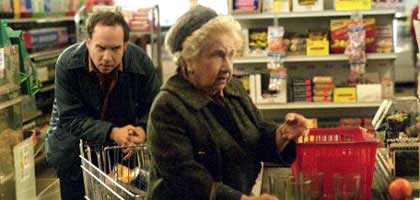
American Splendor
USA 2003

Reviewed by Xan Brooks
Synopsis
Our synopses give away the plot in full, including surprise twists.
Cleveland, Ohio, 1975. Harvey Pekar (Paul Giamatti) has reached his limit. His job - as a filing clerk at the local VA hospital - barely pays the bills. His second marriage is on the rocks and he has lost his voice from too much shouting. Determined to make something of his life, Harvey writes a comic strip documenting his humdrum existence, and his friend, famous cartoonist Robert Crumb (James Urbaniak), agrees to illustrate it. The resulting series of books, American Splendor, earns its star cult celebrity, attracting the interest of Joyce Brabner (Hope Davis), a fan from Delaware. Harvey and Joyce get married.
Harvey's fame grows when he is booked as a regular guest on the David Letterman show. Meanwhile his nerdish work colleague Toby (Judah Friedlander) becomes a fixture on MTV. But Harvey's life hits further turbulence when he discovers a lump on his testicle and then launches a political diatribe on Letterman's show. Diagnosed with lymphoma, he begins a course of chemotherapy. His experiences are detailed in a graphic novel, Our Cancer Year, that Joyce organises alongside local illustrator Fred (James McCaffrey). While working on the book Joyce and Harvey strike up a friendship with Fred's infant daughter Danielle (Madylin Sweeten), who later becomes their surrogate daughter. Harvey retires from the VA hospital, but insists that the story of his life does not have a happy ending.
Review
American Splendor opens with a pre-credits sequence that installs its hero at the end of a line-up of costumed trick-or-treaters. It is Halloween, 1950, and the infant Harvey Pekar is huddled on a porch alongside Batman, Superman and the Green Lantern. "Harvey Pekar?" scoffs the unimpressed neighbour who answers the door. "That doesn't sound like a superhero to me."
The irony is that Harvey Pekar would grow up to be just that. In middle age, this humble file clerk blossomed into an unlikely cult icon, courtesy of writing and starring in the American Splendor comic-book series. Illustrated by Robert Crumb (among others), American Splendor conjured dramatic art out of Pekar's mundane existence, and spun rousing ballads out of his ill-tempered squabbles with the world. His super-foes were hectoring bosses, office bureaucracy and "old Jewish women" who kept him waiting at the supermarket. His arsenal was the lightning bolt of misanthropy and the glorious shield of self-obsession.
Directed by documentary-makers Shari Springer Berman and Robert Pulcini, American Splendor essentially gives us the film of the comic of the life of Pekar. This is a playful, wilfully self-reflexive affair, a centaur-like meld of documentary and fiction. Thus Berman and Pulcini's exploded structure invites the real Pekar to narrate the story being enacted by his fictional alter ego (played by Paul Giamatti). "Here's our man," he croaks by way of introduction. "Yeah alright, here's me. Or the guy who plays me anyway." On another occasion the barrier breaks down entirely as the film's actors share the soundstage with their _real-life counterparts.
The point of this approach is the quest for biographical truth. Just as Pekar's comic books purport to be a warts-and-all depiction of his daily life, so Berman and Pulcini's biopic strives for a free-form structure that avoids the airbrushed "Hollywood bullshit" their subject detests. For most of the time the technique is vibrantly convincing. Occasionally, though, one catches glimpses of a possible gap between the fictional re-enactments and the documentary fact. As played by Giamatti, Pekar emerges as a comical curmudgeon: neurotic, grumbling but essentially harmless. By contrast, the archive footage of the real-life Pekar suggests a more combative, paranoid (and less likeable) side to his character.
Then again, you could argue that this friction is what makes American Splendor so special. The whole picture is basically ordered as a stand-off between dramatic reconstruction (as represented by both comic book and movie) and grubby, open-ended reality. At one point the real Joyce Brabner takes issue with the version of events peddled by her husband's comics ("Harvey tends to push the negative and the sour"). Later, as he battles cancer, Pekar comes to view his alter ego as an entirely separate entity: "If I die, will that character keep going?"
The likes of Superman, Batman and the Green Lantern patrol a far simpler terrain. Their fictional landscapes are places of clearly delineated good and evil. But Harvey Pekar is not your average superhero. He's at once author and character, hero and victim, his life and his art the result of a perpetual two-way osmosis. Standard biography is no match for such a man. It takes a film this quick, mercurial and multi-layered to keep up with him.
Credits
- Directors
- Shari Springer Berman
- Robert Pulcini
- Producer
- Ted Hope
- Screenplay
- Shari Springer Berman
- Based on the comic book series American Splendor by
- Harvey Pekar and Our Cancer Year by Harvey Pekar and Joyce Brabner
- Director of Photography
- Terry Stacey
- Editor
- Robert Pulcini
- Production Designer
- Thérèse DePrez
- Music/Music Conductor/ Orchestrator/Producer
- Mark Suozzo
